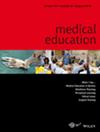Study the past if you would define the future: Historical methods in medical education scholarship
Abstract
Introduction
A study was conducted to describe the state of historical scholarship in medical education including its strengths and opportunities as well as its shortcomings, lacunae, inattentions, and failings. The study took a particular focus on historical methods and methodologies and whether they have been applied appropriately and with rigour. The study serves as a descriptive scan of historical scholarship, as a guide to the use of historical methods for authors, editors and reviewers, and as a possible course correction for improved standards in approaching and reporting on the past in medical education scholarship.
Method
A meta-study review was conducted to explore the current state of historical scholarship in medical education, to understand the state of the art, and to improve methodological, analytical and reporting rigour. Structured searches were conducted, returns were filtered for inclusion, and 85 articles and chapters were critically analysed.
Results
Although there were some exemplary articles identified, the majority reflected many deficits in scholarly practice. Seven broad issues in historical scholarship in medical education were identified that all spoke to the absence of key dimensions of sound scholarship namely: an explicit methodology, explicit engagement with theory, attention to replicability, reflective critique, sources of evidence, a balanced argument, and attention to positionality.
Discussion
The issue at hand is not simply about aligning historical scholarship with the standards of social science (such as engaging with methodology, theory and reflexivity), although the authors argue that scholars should do so where appropriate. Rather, it is about the implications these findings have for future work in the field of medical education in studying its many intertwined histories. To that end, there is a discursive space for historical scholarship in medical education that needs further exploration and development to bring together the best of scholarship from the traditions of medical education and history.





 求助内容:
求助内容: 应助结果提醒方式:
应助结果提醒方式:


